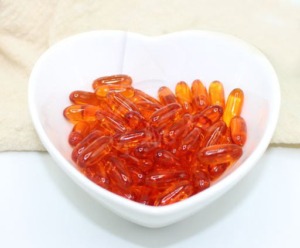In China, Seabuckthorn pulp and seeds have been used as herbal remedies for burns and wound healing, cough suppressant, or digestive aid. Seabuckthorn seed oil contains a high proportion of essential unsaturated fatty acids such as oleic acid, palmitic acid, and linoleic acid. Besides, it also contains tocopherols, phytosterols proanthocyanidin, and carotenoids, ponderable bioactive substances. High levels of β-carotene, β-sitosterol, and α-tocopherol have been shown to have protective activity on the stomach. Proanthocyanidins are antioxidant flavonoids that not only have neuroprotective effects in humans and animals but also reduce pica behavior.
 Meanwhile, it has been shown that seabuckthorn seed and pulp oil are effective in the prevention and treatment of gastric disease. And sea buckthorn seed oil can treat diseases such as gastric ulcers induced by dexamethasone. Our study results revealed that seabuckthorn seed oil inhibited the kaolin intake, increased food intake, and promoted gastric emptying in the cisplatin-treated patients.
Meanwhile, it has been shown that seabuckthorn seed and pulp oil are effective in the prevention and treatment of gastric disease. And sea buckthorn seed oil can treat diseases such as gastric ulcers induced by dexamethasone. Our study results revealed that seabuckthorn seed oil inhibited the kaolin intake, increased food intake, and promoted gastric emptying in the cisplatin-treated patients.
Chemotherapy is a common treatment for many cancer patients, but it is often accompanied by severe nausea and vomiting. In our present study, increase of kaolin intake indicated nausea and vomiting induced by cisplatin. Although cisplatin is effective to treat cancer, it causes the formation of free radicals in the intestine that release 5-HT. This release of 5-HT relaxes the stomach by acting on the 5-HT receptor, resulting in a delay in gastric emptying, which reflects the accumulation of food substances in the gastric and leads to vomiting.
Although progresses have been achieved in resistance to vomit treatment, chemotherapy-induced vomiting remains a significant burden for chemotherapy patients. Inhibition of ileum contraction by acting on the 5-HT3 receptor may be related to its antiemetic activity. Inhibiting the increase of dopamine (DA) in the peripheral and central systems by inhibiting dopamine D2 receptor (D2R), tyrosine hydroxylase (TH), and promoting dopamine transporter (DAT) is beneficial to cisplatin-induced nausea and vomiting (CINV). OXA is a recently revealed hypothalamic neuropeptide of 33-amino acids that affects gastrointestinal motility, promotes eating, and increases body weight.
Orexin-A (OXA) is an important peptide related to food intake. OXA neurons are mainly expressed in the regions of the lateral hypothalamus, lateral dorsal side, and around the fornix. OX1R, the main receptor of OXA, is widely expressed in the central nervous system, especially the hypothalamus and brainstem. It is reported that intracisternal administration of OXA relaxed the proximal stomach and facilitated the motility of the antral portion via the vagus nerves. In our present study, a decrease of plasma OXA, OX1R expression in the hypothalamus and brainstem, OXA expression in the lateral hypothalamic area (LHA) was observed.
The above finding indicated destruction of the OXA system by cisplatin, which might be involved in the pathogenesis of the CINV. Kaolin intake is commonly used to assess cisplatin-induced pica and vomiting. Antiemetic effects of newly developed medicines in preclinical studies have illustrated that OXA can also influence the increased kaolin intake induced by cisplatin. OXA involvement in the arcuate nucleus (ARC)-paraventricular nucleus (PVN) circuitry in the brain promoted gastric motility to mitigate the emesis induced by cisplatin.
Based on the above findings, we have explored the underlying mechanism of seabuckthorn seed oil in the treatment of CINV. Also, a potential role involved in OXA has been found in our present study. The increase of plasma OXA level after seabuckthorn seed oil pretreatment in cisplatin-induced vomiting may be related to the acceleration of gastric emptying. Additionally, the expression of OX1R mRNA and protein in the hypothalamus and brainstem and OXA in the LHA increased after treatment with seabuckthorn seed oil, indicating a central effect of seabuckthorn seed oil. The reason may be that proanthocyanidins and total flavonoids in seabuckthorn seed oil can regulate the expression of OXA in LHA through the blood-brain barrier.

Leave A Comment